

Do collective nouns need a plural verb? Collective Nouns and Pronouns. English nouns are either countable or uncountable.
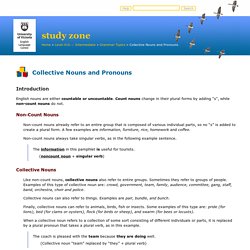
Count nouns change in their plural forms by adding "s", while non-count nouns do not. Non-Count Nouns Non-count nouns already refer to an entire group that is composed of various individual parts, so no “s” is added to create a plural form. A few examples are information, furniture, rice, homework and coffee. Population noun.
Means definition and meaning. A secret about collective nouns: Learn English in a minute! BBC World Service. YouTube.
Are Band Names Singular or Plural? On Twitter, a user with the handle noisejourno asked about band names, writing Collective nouns, such as the word band, are generally singular in the United States; but for band names, most people go by the rule that if the band name sounds plural (like the Beatles or Black Eyed Peas), they treat the name as plural, and if the band name sounds singular (like Fall Out Boy or Coldplay), they treat the name as singular.
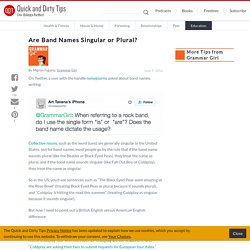
So in the US, you’d see sentences such as “The Black Eyed Peas were amazing at the Rose Bowl” (treating Black Eyed Peas as plural because it sounds plural), and “Coldplay is hitting the road this summer,” (treating Coldplay as singular because it sounds singular). But now I need to point out a British English versus American English difference: British writers are more likely than American writers to treat all band names as plural. Sources. BBC World Service. BBC World Service. Collective Nouns. Page 1 of 2 Today’s topic is collective nouns, nouns that describe a group, such as “family,” “orchestra,” and “board.”
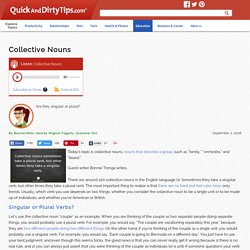
Guest-writer Bonnie Trenga writes, There are around 200 collective nouns in the English language (1). Sometimes they take a singular verb, but other times they take a plural verb. The most important thing to realize is that there are no hard and fast rules here, only trends. Singular or Plural Verbs? Let’s use the collective noun “couple” as an example. Here’s another example. American vs. Adding to the complexity of this issue is that Americans and Britons handle it differently.
Americans tend to treat collective nouns as single units, so it’s more common to use the singular verb unless you’re definitely talking about individuals (3). In British usage, however, it’s the opposite; it’s more common to use the plural verb (4). Pages.
How to use collective nouns. I’d like to begin with a quick mental workout.

Do you know which of the following sentences, both found in the same British online newspaper in 2003, would be considered incorrect according to standard British and American usage, and why? Colchester police has also queried the proposal. Colchester police have launched a new tough approach on people begging in the town. If you think the first example is ungrammatical, award yourself a Brownie point or two!
Collective Nouns and Consistency. In American English, most collective nouns take singular verbs—except when a sentence emphasizes the individuals in the group, not the group as a whole.

In a sentence like The faculty is organized into eight departments, the collective noun faculty is singular. But consider The university’s faculty are renowned scholars in their own right. These Nouns Present Singular Problems. Welcome to your GrammarBook.com e-newsletter.
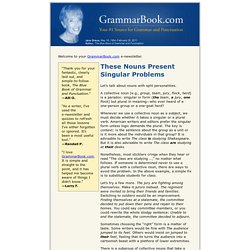
Pop Quiz 1. The crowd is/are filling up the arena. 2. The enemy consists of/consist of that country’s fiercest warriors. 3. The public is/are invited to sit anywhere on the lawn. Do collective nouns need a plural verb? A collective noun is a name for a group of people or things such as "family," "class," "pack," "bouquet," "pair," and "flock.
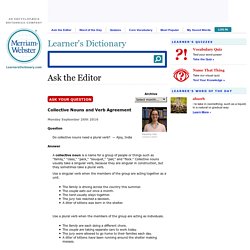
" Collective nouns usually take a singular verb, because they are singular in construction, but they sometimes take a plural verb. Use a singular verb when the members of the group are acting together as a unit. The family is driving across the country this summer.The couple eats out once a month.The herd usually stays together.The jury has reached a decision.A litter of kittens was born in the shelter.
Use a plural verb when the members of the group are acting as individuals. The family are each doing a different chore.The couple are taking separate cars to work today.The jury were allowed to go home to their families each day.A litter of kittens have been running around the shelter making messes.
Class. Team. Congress. United States. Faculty. Group. Family. Couple. A secret about collective nouns: Learn English in a minute! How IS your family? or How ARE your family? The correct way to word this question is “How is your family?”

The reason is that while family refers to a group of people, it refers to the group of people as a single unit, or collection. Self-grading multiple-choice exercises. ‘Majority is’ vs. ‘majority are’: Collective nouns in English. Content Frame. People Versus Entities. Grammar Girl here.

Aliza in Alaska recently asked whether she should use who or that to refer to a board of directors. Today we're going to decide whether companies are people or things; in other words, whether you use the relative pronoun who or that when referring to an entity like a company or board of directors. I had to look this up the first time someone asked. For many years, before I became Grammar Girl and had to answer people's questions, I simply rewrote sentences to avoid having to figure this one out. People Versus Entities What confused me was that even though companies are entities, they're made up of people. Today, the MegaCo directors, who just gave themselves a raise, laid off 1,000 factory workers. Content Frame.
When it comes to subject-verb concord, how do you teach collective nouns such as committee, family and government?
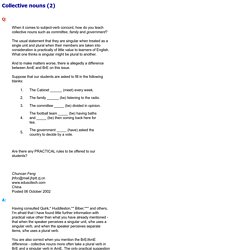
The usual statement that they are singular when treated as a single unit and plural when their members are taken into consideration is practically of little value to learners of English. What one thinks is singular might be plural to another.And to make matters worse, there is allegedly a difference between AmE and BrE on this issue.Suppose that our students are asked to fill in the following blanks: Are there any PRACTICAL rules to be offered to our students?
Chuncan Feng jhfcc@mail.jhptt.zj.cn www.eduscitech.com China Posted 06 October 2002 Most collective nouns, such as "committee" and "government," typically take singular concord:Writing in the Harvard International Review, he says that his [committee] approves covert operations only when there's a consensus. (NEWS)The Government has indicated it will make provision in the Bill for such an amendment. Matching verbs to collective nouns. Collective nouns are nouns which stand for a group or collection of people or things. They include words such as audience, committee, police, crew, family, government, group, and team. Collective Nouns.